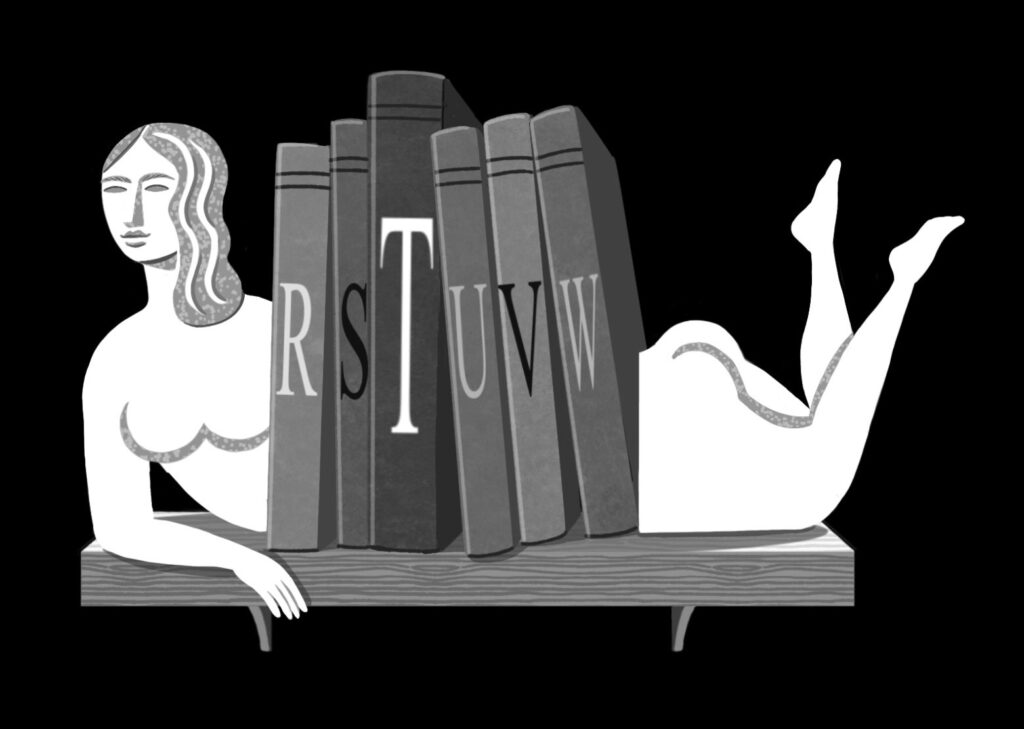In October 2020, the novelist Thea Lim organized the Book Auction to Support Prisoners, a stand-alone fundraising event to benefit a COVID‑19 relief fund for incarcerated Canadians. Sheila Heti donated a signed first edition of her 2010 book, How Should a Person Be? My bid won, and she sent me the novel together with a signed copy of her 2001 debut story collection, The Middle Stories. Her inscription was pithy and meaningful: “Thank you for helping the prisoners! I hope you are not one, in any way.” It saddens me to share that, as revealed by her Alphabetical Diaries, Heti herself has become a prisoner — not of any particular person or ideology but of her own pursuit of pleasure.
The basic premise of Alphabetical Diaries is enticing and formally inventive. Heti copied 500,000 words from a decade of her journals into a spreadsheet. Then she arranged the sentences alphabetically before cutting nearly 90 percent of the original content. It is an experiment in organizing a life, but it is more fundamentally about curation. Amid some banal moments — Heti wonders if her love interests will call and frequently worries about money — it’s easy to lose sight of the massive amount of content that she began with. A half-million words would be a 2,000-page novel. Heti’s final version is not just a rendering of a life organized alphabetically. It is instead a highly curated depiction of her persona, one that she has chosen to share with the world.

Now we know her ABCs.
Jamie Bennett
The alphabetical organization is a creative way of showing her preoccupations over the years. Elements of her personality suddenly become evident: in the D chapter, for example, there are many more sentences starting with “Don’t” than with “Do,” indicative of a person trying to change. Men appear far more frequently than women. Heti’s father comes across as more important than her mother. Her brother appears rarely, only when he is missed. Thoughts of finishing “the book” come up multiple times. But the major recurring themes are her lovers: Fiona, Lars, Pavel, Vig. She worries about pleasing them: “Make him feel loved and special.” She knows how much she loves sex: “How much I enjoy pleasure.” And she understands, very clearly, how her relationships and pursuit of pleasure dominate her life: “How can I possibly write when I’m obsessed with my relationships?”
It’s not just that Heti is obsessed with her relationships and that she’s preoccupied with sex. As it is in How Should a Person Be? and later works, the sex described here is abject, thoroughly humiliating. I never had an issue with her preferences before Alphabetical Diaries — her pleasure is her own, and I have no interest in being some kind of morality cop — but I do care about consent. Hers is openly violated by Vig in a scene in chapter T, when she describes her first experience of anal sex with him. She is tied up, pleading “no no” as he continues, an experience she describes in the same breath as having “felt amazing.”
Sexual violence is incredibly common. Statistics Canada reports that almost half of Canadian women have experienced some form of intimate partner violence since the age of fifteen. I’m included in that statistic, as are, I’m sure, many of this book’s other readers. This instance of disregard for consent in her pursuit of pleasure is a scene that I wish Heti had filtered out in her cutting process. She chose to depict that version of herself to the world in a project that allows for no context, no editorial explanation of a possible safe word. Without such context, the scene lends credence to would‑be perpetrators, those who view “no” as another form of “yes.” I find that curatorial decision vile.
To be sure, there are moments of beauty and brilliance in the book, which Heti’s publisher has marketed as “literary fiction.” A standout from chapter A: “Art is not essential, but love is essential, and maybe that is why people make art, to express their love of something — that tree, humans, the world, language, intensity of thought — and the person who doesn’t respond to a work of art is perhaps missing the love of the thing which the artist is pointing to, lovingly.” In the huge chapter I: “I am looking forward to writing and the beauty and rhythm of the sentences I will write, to outlining a world, and making it real, and taking the conventions for granted, and seeing what is the best thing I can make.” Heti’s attention to rhythm and language provides a feast for the hungry, and her insights on art are compelling.
My curiosity was piqued by a reference to her “seven-hundred-page book,” critiqued brutally by Pavel. Unlike him, I think that Heti’s writing style alone will make it “worth reading” if she ever publishes it. She is a remarkable voice, one who can render human behaviour honestly, and she puts herself on display in order to further her project, an action that deserves commendation for her bravery. But I do hope that she’ll recognize her power and be more careful about consent when writing her sexual experiences into her future work. Heti’s books are now instant bestsellers, marketed by the most influential global press of our time. It’s sad, for me, that an otherwise beautiful experimental text is marred by one jarring, horrifically familiar scene, one that detracts from the limited progress the #MeToo movement has made.
Sheila Heti, I hope that, wherever you are, my interpretation of you is wrong, and that, as you wrote to me nearly four years ago, you aren’t a prisoner in any way.
.

